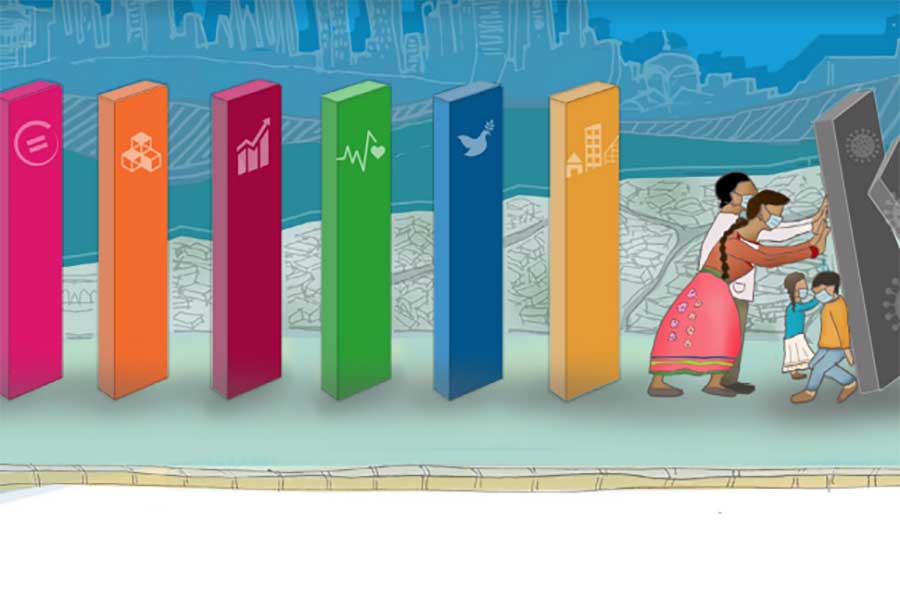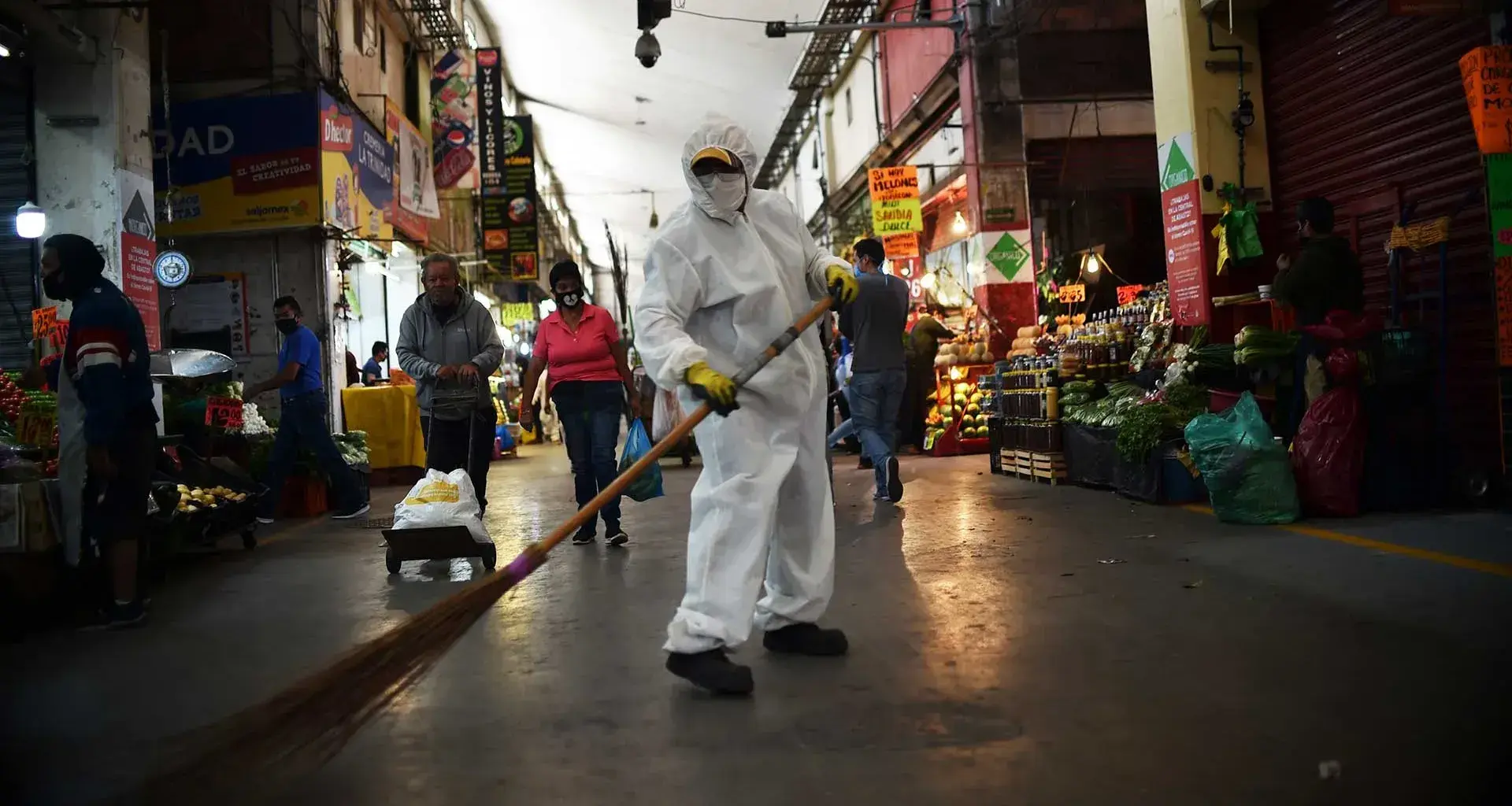Cover photograph: Rodrigo Arangua/AFP
A partnership between Tec de Monterrey and UN-Habitat seeks to help municipal governments across the country plan their socioeconomic recovery strategy in the context of the Covid-19 pandemic.
Professors from the C+LAB at the Tec’s School of Architecture, Art and Design (EAAD) have created a platform offering a training program for public officials.
The platform contains the Methodological Guide to Municipal Socioeconomic Recovery in the Context of COVID-19, to support local governments in formulating multidimensional diagnoses for developing strategies and action plans.
The guide was developed by UN-Habitat and other organizations such as the Ministry for Agrarian, Territorial, and Urban Development (SEDATU), the Ministry of Health, and the World Health Organization.
Alfredo Hidalgo, Dean of Research and Extension at the EAAD and leader of the Tec initiative, said that the institution had made a proposal to UN-Habitat to develop a platform with online courses and seminars to explain the guide.
“There are two levels of access: one is a guide summarized into three relatively quick courses and the other is three seminars in which the main points of the guide are presented by experts from each field,” he explained.
The courses are online and last one hour while the seminars last eight hours each, and also include one synchronous session each month and activities outside the classroom.
Hidalgo added that you can also download the complete guide on the Tec-designed website, which also has a chatbot using artificial intelligence to give advice.
Online training
Officials will be able to learn about and understand the methodologies proposed by the UN-Habitat Guide, as well as receive training through videos, infographics, questionnaires, texts, and animations, among other content.
“There are videos by teachers, instructors and the authorities; there are also animations and graphics that make it easier to understand what is being proposed.
“In addition, pedagogical tools are used to facilitate the learning process; there’s a series of resources to make the courses and seminars very user friendly,” explained the dean.
He said that as they are free, these courses and seminars can be used by local governments which (unlike those from large cities) may not have enough resources to create a post-pandemic recovery plan.
“This guide will be very important for them because it will mean their teams have a tool which is easily accessible, and which they can learn about through the platform we offer,” he said.
The content will be available on the platform for a year, so participants will have several months to complete their training, the dean added.
In order to access the seminars, public officials will be required to have completed the first three courses.
“In addition, the seminars require participants to submit information, projects, and certain products which they have to generate. That’s why, at the end of the process, they’ll receive a certificate for having taken part in the seminar,” said Hidalgo.

“What makes this important is that the guide becomes a very useful tool that has this educational and training component endorsed by international organizations, which goes hand in hand with the Tec, an institution with experience in education.
“We used all of the Tec’s knowledge and experience in remote education to be able to summarize the guide and include the participation, opinions, and comments of the leaders from the institutions that produced it,” he added.
The dean said that the program was created through the platform used by the Tec’s Vice-Rector’s Office for Continuing Education to offer distance learning opportunities.
“Our teams of Digital Art professors developed the graphic design and created the character who accompanies the readings on the page. The graphic design had to be compatible with the image and communication guidelines of UN Habitat,” he shared.
In terms of the content of the seminars, Hidalgo highlighted the participation of EAAD faculty members, as well as those from the School of Government and Public Transformation and teachers who collaborate with the Tec via Continuing Education.
“The professionals in the field who developed the course are international consultants, instructors, and expert professors on the subject who did so as they would for the Tec courses we give at undergraduate, postgraduate levels, and Continuing Education levels,” he said.
Developing partnerships
Prior to the development of this project, UN-Habitat Mexico and the Tec (through the EAAD) had already worked together on creating the New Urban Agenda diploma course, for example.
On this occasion, the Tec became an implementation partner for the training process relating to the guide after responding to an invitation to tender a proposal.
“We were invited to participate as a university particularly because UN-Habitat recognized that we have a space that specializes in urban issues within the institution, the C+LAB.
“We collaborated with UN-Habitat previously on creating the diploma course and on a book which is also a guide for public spaces. We created the version in Spanish, so there is already a history of work that they have seen from the Tec,” he said.
The guide developed by UN-Habitat proposes a six-step methodology for social and economic municipal recovery.
“Six steps are given for recovery to happen: they are governance, working with people, multidimensional diagnosis, priorities, drawing up a plan, and implementing it.
“To create the training, we had to understand what the guide was about, its methodology, and how it was going to be structured; we began the process when the guide was still in draft form,” said the dean.
He added that it is important for Tec to participate in this type of project, which focuses on the training of public officials and the identification of best practices in the growth and development of cities.
“The Tec is interested in transforming lives and, particularly, in transforming communities and cities, and this context is a huge opportunity to continue doing so,” Hidalgo concluded.
Click here for further information or to register for the courses and seminars.
YOU’LL DEFINITELY WANT TO READ:





